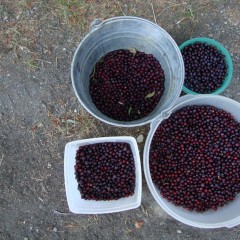
Like many Northwesterners, I recently participated in the summer ritual of picking huckleberries. It is a last hurrah of the season, drawing us northward and upward, into the woods; or to a ditch on the side of the road. These tiny, purple, flavorful jewels seem to capture the rugged, outdoor identity of this area, and their rarity follows the economic principle of ‘scarcity leading to demand.’ In fact, these berries’beauty lies in the fact that they cannot be commodified.
“But wait,”you are thinking, “you can buy huckleberry ice cream, huckleberry jam, and (my favorite) huckleberry cream ale. You can purchase a gallon of huckleberries at a fruit stand or from the back of a pick-up truck.” Yes, all those are true. But the degree to which this happens is on a much smaller, localized scale.
For the most part, huckleberries cannot be cultivated. They require a cold climate, one that offers a blanket of snow in the winter for protection and it takes up to 15 years from planting to reaping fruit. In other words, its very difficult to make a significant amount of money from the crop. And that’s what makes them so desirable: you can’t stop by your local Safeway and purchase a pint of huckleberries transported from California in February.
Huckleberries are small, so small that side-by-side they are dwarfed by blueberries. Finding them often relies on word-of-mouth, friends and family sharing the best locations like secret fishing spots. Picking them can require hiking along a trail or trudging into the wilderness. You must crouch down to reach the short bushes; sometimes just plopping down with legs crossed is the best method. You may scratch up your legs scrambling through the brush, get stung by a bee, or, even better, encounter a bear competing for your haul. For this last reason, picking is often conducted with talkative friends. It takes a commitment of effort and time to get enough berries to make a pie.
In our consumer society, we are accustomed to having easy access to several options and picking the one we like best with little to no thought about how that product came about. In many instances those options involve the commodification of people, their value lying only in the amount of produce they can move from plants to plates. The options we don’t choose are often thrown away, the hard work of many wasted. And being unaware of the population that produce comes from makes it easier to let it rot in our fridge before getting around to making that salad. We are conditioned into believing that there ‘is always more’somewhere.
Huckleberries come with a story, something that is missing from most of our food. In winter, when we pull out our bag of frozen treasures on a Sunday morning to dot our pancakes, we remember the foraging before we feast. We feel the sun’s warmth and smell the nearby pine trees. We visualize the awe-inspiring mountains, hear the chattering of chipmunks, and taste the berries that didn’t make into out containers. We remember how hard it was to stop picking even though our middle-aged bodies were telling us to stop. And we think of the berries left behind, available so others could enjoy a similar experience. Or for the bears.
Those of us who have embarked on a huckleberry adventure are glad there are still some things that cannot be turned into part of the GDP. It allows us to reconnect with the source of our existence. We step away from grocery carts, scales, and the beeping of checkout lanes and head to the woods. We seek these small, sweet morsels that exist outside of the effort of human hand. In turn, we are reminded of God’s power, beauty, and love for all living things.
It is a ritual I feel blessed to be a part of, a ritual I hope you experience before summer fades away.









I have yet to go pick this amazing fruit yet!
It’s getting a little late in the season now, but next summer we’ll have to fix that, Tracy!
OK!